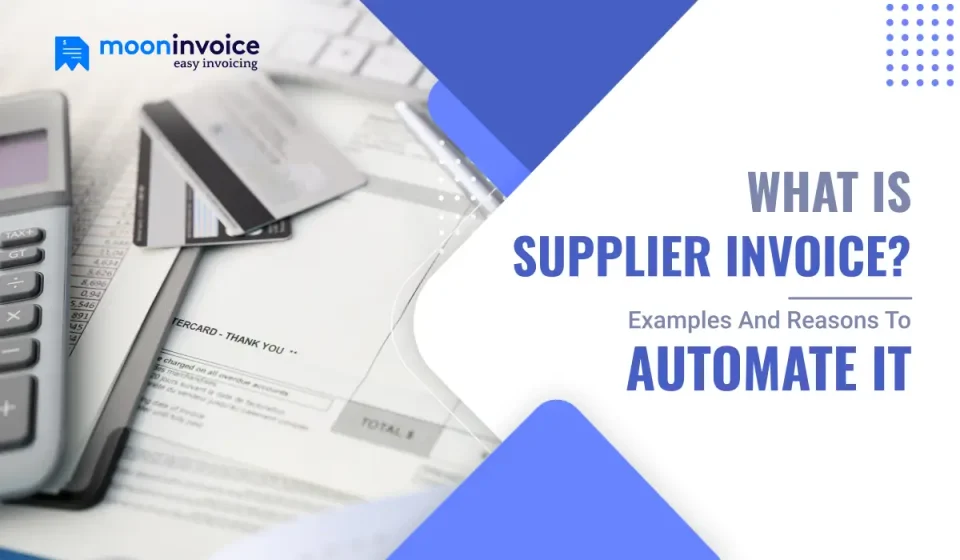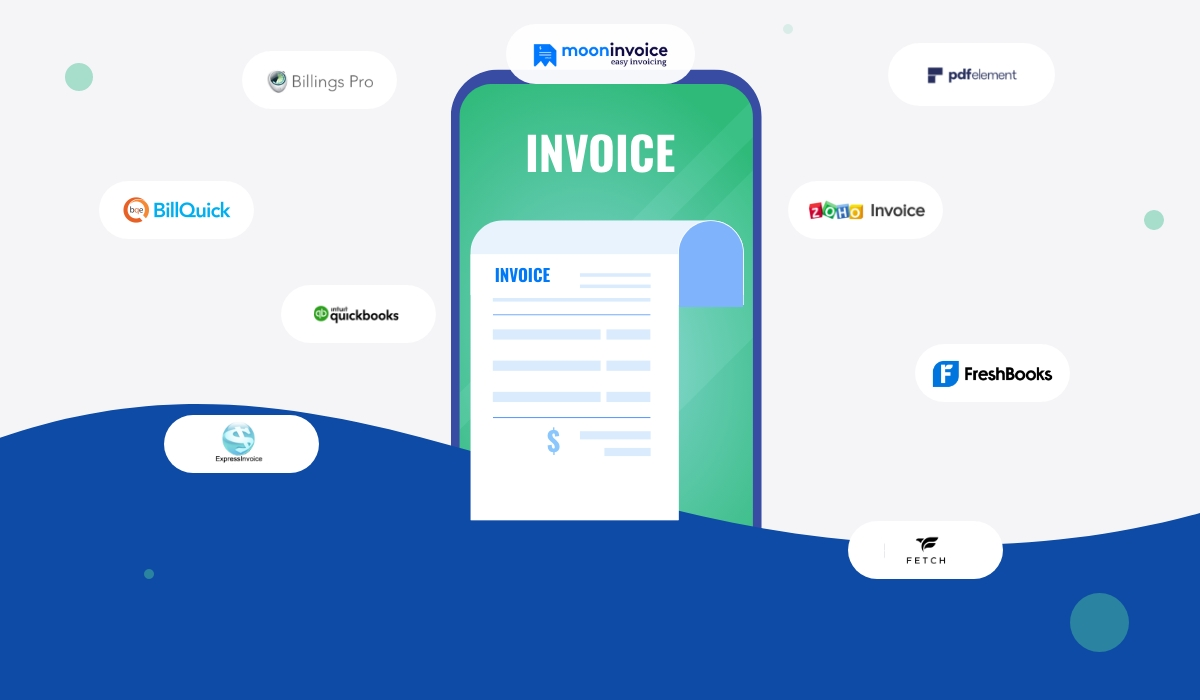Invoices and bills are crucial documents for every company that wants to keep track of its financial dealings. Many different invoices are utilized in commerce, and supplier invoices are only one. A Supplier Invoice is used to track the money they owe and any relevant taxes on that money.
It’s not always the case that when a buyer receives an invoice from a supplier, the buyer is also billing the customer directly. There is no special meaning attached to the word other than its widespread usage in the corporate world. Invoices come in various forms, with supplier invoices being only one. Other forms include credit invoices, debit invoices, intermediate bills, final invoices, and commercial invoices.
What is a Supplier Invoice?
Bills and invoices for goods and services are known as “supplier invoices” and are sent by the providing vendor to the purchasing client. Vendor invoices are another term for supplier invoices used by buyers.
A supplier invoice breaks out the costs associated with a purchase. Invoices often include payment conditions and acceptable payment methods if the seller-provided credit to the customer in connection with the transaction.
Suppliers can also issue a consolidated month-end statement for all unpaid outstanding transactions. If this is the case, the corporation should clarify that no further supplier invoices will be issued.
Traditional invoices have been documented on paper, with numerous copies produced to ensure that both the buyer and the seller have a copy for their files. Automation solutions and Software may now create invoices automatically, making it much simpler to track a particular purchase or categorize bills based on a certain period range.
Vendor invoices make up a subset of documents that, until recently, were mostly handled manually when keeping track of business dealings.
Automating your supplier invoicing & accounts payable process may boost productivity, remove stress on internal resources, and strengthen relationships with your suppliers. What follows will explain how invoice creation software can help you and your labor accounts payable department manage your cash flow well.
Supplier Invoice Example

Making sure you are familiar with the major sections of vendor invoices can aid your company in interpreting these documents in the future, whether you are the sender or receiver. Typically, these components will be present using accounting software:
Invoice Number: With this specific identifier, companies may easily maintain tabs on past transactions and plan for upcoming or recurring billing.
Date of Invoice: this is the date of the transaction and may be the same day the buyer receives a bill.
List of Goods and Services Provided: Invoices usually break out the items and services acquired alongside their respective prices line by line, with the total, including shipping costs, tax, and other charges, shown at the very bottom.
Payment Terms: Payment terms are worked upon between the customer and seller and might include a credit line, prepayment, payment upon receipt of an invoice, etc.
Payment Due Date: The standard payment time is 30 days from the date of the invoice; however, this might vary depending on the nature of the transaction.
Contact Information: the company or client’s name, address, phone number(s), email address(es), and sometimes the billing division(s).
These are the same as the routine sales invoices.
Reasons to Automate Supplier Invoices
Improving your company’s accounts payable procedure might result in timely payments. (You are about to avoid late payments). Thanks to these enhancements, your company and accounts payable department may benefit from more transparency and lower operating expenses. In many ways, an organization may benefit from automating its accounts payable processes using automated invoice processing software.
1. It Lowers the Costs
Processing an invoice manually incurs an average cost of $15 to $25, according to a MarketingScoop report.
You also must consider the time-consuming process and money spent manually in invoice processing. Without automation, your workers will have to manually retrieve documents from storage, file them away, or even find the bills they were supposed to pay. They can avoid doing all those things and boost productivity using automated invoice processing.
Utilize automation in invoice processing; you can be certain that your check statuses will be displayed, your processes will be spotless, and your staff will be able to respond to your inquiries immediately, eliminating the need for them to play phone.
2. It Helps in Improving the Productivity of the Team and Business
You may find that your accounts payable (AP) department is overburdened by the number of manual data entry operations that involve your vendors.
Workflows that are too slow or tedious force workers for wasted time on mundane activities, data entry, or rectifying payment errors rather than focus on more strategically valuable jobs. Congestion and inefficiency may also be caused by simple human error.
With automation in the accounts payable process, the software handles the mundane duties, freeing up your finance teams to concentrate on strategic initiatives and strengthen supplier relationships by reducing payment errors.
3. The Business will have a Steady Workflow
Billing procedures will be followed regularly, as will the rest of the processes in the workflow since automation makes this possible.
Compared to the processing invoices that required physical labor, this one doesn’t cause any delays. When doing things by hand, delays caused by bottlenecks were a constant annoyance. Automating accounts payable removes that roadblock, making for a more streamlined workflow.
4. It will be Easier and Quicker to Perform an Audit
Accounting software has several features that are made available via the automation of processing invoices. A great perk is that reports may be generated promptly.
Run Your Audit More Proficiently
Let our invoicing app generate automated supplier invoices that help in performing an audit smoothly.
The produced reports will be shown in an aesthetically pleasing way that aids the user in spotting any anomalies or irregularities. In most cases, audits are continuous. This data and reports may be made whenever they are required. This expedites the audit process and reduces associated costs.
5. Timeliness of Payments
One of the trickiest parts of running a company is taking care of the money. A solid track record in the financial sector is essential to the growth of any company.
One of the decisive elements in getting a loan from a bank, financial institution, or any other moneylender is one’s credit history and financial reputation. You should make automation your closest friend if you care about keeping your good name in the public eye.
6. It Ensures the Better Compliance
Manual data entry procedures make it hard to guarantee complete compliance throughout your firm. However, if your business’s invoicing is still handled manually, your AP team will be responsible for a disproportionate share of compliance work.
Because of the COVID-19 pandemic, more remote work has been implemented, presenting additional risk supplier invoice management concerns for AP, especially because manual invoicing offers no control or insight into procedures or issues.
Automating your supplier invoicing is possible by avoiding fraud and security risks, tracking all paperwork, attributing changes and versions, and having visible audit trails.
7. It Strengthens and Improves the Relationship with the Supplier
Automating the invoicing process improves the likelihood of payments being made on schedule, strengthening supplier relationships and less headache to the accounts payable team.
In addition, AP automation eliminates the possibility of human error, so you won’t need to contact your supplier to resolve any potential payment discrepancies.
Moreover, you may provide your vendors access to a vendor site where they can do business with you, ask questions, get set up, and send status reports. You and your vendors will benefit from this self-service solution’s increased efficiency and transparency automation solution.
Conclusion
Supplier invoice management has a huge role in your business – never mistake or takes it lightly. Also, don’t underestimate the power of Digitalization and Automation. It’s only to save time and money – it’s about smoothing the entire process of supplier invoices.


















